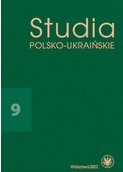Про перешкоди книговиданню, український театр та біографії: елементи власних спогадів у публіцистиці Михайла Комарова
On obstacles to book publishing, Ukrainian theater and biographies: elements of his own memoirs in journalistic articles by Mykhailo Komarov
Author(s): Ihor StambolSubject(s): Theatre, Dance, Performing Arts, Media studies, 19th Century, Pre-WW I & WW I (1900 -1919)
Published by: Wydział Lingwistyki Stosowanej Uniwersytetu Warszawskiego
Keywords: Mykhailo Komarov; Odesa; book publishing; Russian censorship; journalism; bibliography; theater;
Summary/Abstract: The article is devoted to the journalistic heritage of one of the most prominent representatives of the Ukrainian community in the South of Ukraine, who is rightly considered a lawyer, translator, bibliographer, compiler of dictionaries, and public figure Mykhailo Fedorovych Komarov (1844–1913). He was the author of over sixty articles in the literary-critical, socio-political, and biographical context. In his works he often reported on his own experience in a particular case. And in these personal comments or recollections elements of memories of the figure are shown. The purpose of this article is to find out what personal memories the Odesa figure contained in his articles, the objective is to identify memories, determine their thematic direction and value. During the research, it was found out that M. Komarov’s journalism mainly concerned the issue of the arbitrariness of the Russian government in relation to Ukrainian culture and book publishing. His testimony, given the small amount of literature published in the late nineteenth century, is important in many political and bibliographic contexts. The coverage of theatrical life, which the activist joined as a spectator and bibliographer, was of popularizing importance, although it also contains some new facts, for example, regarding the desire of the Ukrainian Coryphaeuses Theatre to tour abroad. Among the new facts that reveal articles about the activities of M. Komarov himself: his pedagogical experience and his books were banned by censorship. Various recollections of biographical stories, both in the context of Taras Shevchenko and other figures, convey both the perception of these personalities at the turn of the century and add new evidence of them.
Journal: Studia Polsko-Ukraińskie
- Issue Year: 2022
- Issue No: 9
- Page Range: 203-216
- Page Count: 13
- Language: Ukrainian

